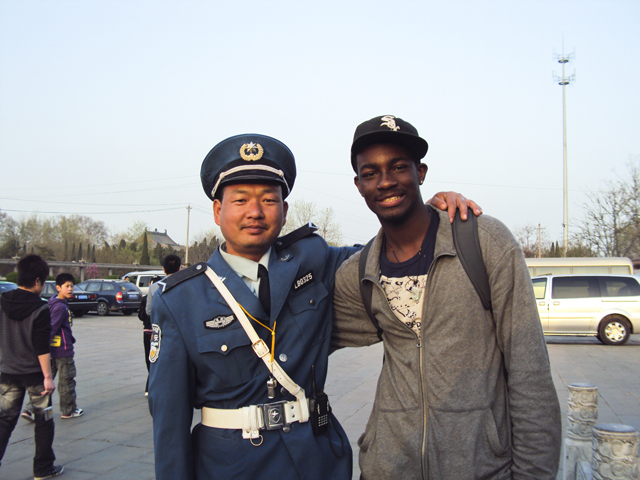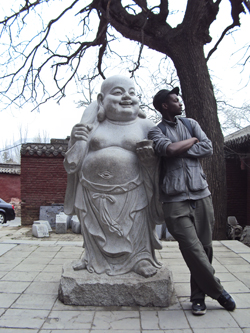
“I had a series of bad teachers who discouraged me,” he remembers. He barely got through high school and just managed to squeeze into Humboldt State.
Yet at age 19, Thompkins was learning to speak fluent Mandarin. Today he has an international certificate in Chinese and a U.S. State Department internship to his credit. When he graduates from HSU in the spring, he plans to spend a year in China, then pursue graduate study at the prestigious Wharton School, founded as the first collegiate school of business in 1881.
Following that, Thompkins hopes to start his own renewable energy research and development company overseas, preferably in China. He attended Xi’an International Studies University (XISU) as a sophomore in 2010 under an ongoing student/faculty partnership aligned with Humboldt State’s Study Abroad program. He fell in love with the language, the country and the people in a romance stirred by high intellectual excitement.
How did this teenager surmount the educational apathy of his disillusioning K-12 experience and discover the joyous life of the mind?
When Thompkins landed in China in early 2010, the only thing he knew how to say was hello. He had had no exposure to the language in Los Angeles schools. “I couldn’t make myself understood at all. I was like a newborn baby. It was a huge challenge, and the will to survive in China drove me.”
In part it was place and in part it was people that behind that drive. As Thompkins talks about it, he speaks of his educational pilgrimage with mounting animation.
It started with initial impressions of China’s history. Shortly after touchdown in February, 2010, Thompkins took his first evening stroll in a Xi’an park that is home to the famous seven-story Dayan Ta (Big Wild Goose) Buddhist pagoda, built in 652 during the Tang Dynasty. The park was necklaced with classical Chinese lanterns, set off by a resplendent water display, the nation’s largest.
Thompkins was moved by the ineffable ancientness of China that he sensed in the park’s tableau. A sudden historical awareness overtook him in the night air. He couldn’t have prophesied what was going to happen to him next: his life was about to be altered permanently, right there in the park.
“The magic happened when I’d been in China only two weeks. Walking in the park, I chanced to see this old Chinese man with a giant paint brush. He was stroking giant characters directly on the ground. Right at that instant, I said to myself, ‘That’s it! I want to master Chinese characters! I have to do it!’ That moment changed me forever. I knew I wanted to live in China, to work there—I wanted to do everything there. It changed my heart!”

The epiphany wasn’t over, the magic persisted. When Thompkins moved his belongings from his initial quarters in a hostel to XISU’s international dorms, good fortune intervened again. A Chinese student named Feng Sheng, who spoke “wonderful English,” introduced himself to the new arrival and offered to help with his luggage. When Feng found out his new acquaintance hoped to learn Mandarin, he offered straight off to tutor him.
The first day of classes, Thompkins realized immediately, “I was in way over my head.” He telephoned Feng, who began by teaching the Chinese words for the seasons. He tested Thompkins the very next day, and went on to teach him numbers and practical Chinese characters for conducting routine transactions like bank withdrawals.
Feng saw that his protégé had an exceptional memory for Chinese characters and a strong work ethic. “I stuck to it,” Thompkins says. “As it turned out, he tutored me the entire semester at XISU.”
The Humboldt State senior credits Feng with enabling him to learn the language so quickly and comprehensively. To be sure, his mentor was “very strict. He would have me write a given character 40 times on the chalk board.”
Yet Feng also found time to discuss Chinese history and culture with his American study-abroad student. In turn, Feng was fascinated by America. “He constantly asked me questions about the states while he told me about China,” Thompkins says. “He was devoted to me and although he was a student and only 22, he taught me the art of studying—how to take your studies seriously, how everything you learn relates to something else. He was a huge factor in my China experience, as were my professors. Every one of them was excellent, very inspiring. When I raised my hand, they always called on me, interacted with me. I didn’t experience that very often in my classrooms back home. ”
Last May, back at Humboldt State, Thompkins passed a standardized proficiency test administered by the International School at Beijing. Having learned more than 5,000 characters, he is officially designated a fluent speaker, certified that he can read, write and speak mandarin.
This past summer, Thompkins interned at the U.S. State Department in the Bureau of South and Central Asian Affairs. He worked as an India Desk officer on bolstering Washington’s trade relationships with India and Bangladesh. His experience in HSU’s Study Abroad program served him well on the desk. While in Xi’an he had met many Indians as well as Kazakhs, Uzbeks and Tajiks.
Currently Thompkins is pursuing summer work opportunities in China, where he hopes to return after graduation in May.
Reflecting on his years at Humboldt State, he recalls that his attitude toward education changed the first week he arrived, well before the blossoming of his love for China. “What changed my mind about learning was being around people here who really care about education,” he observes. “I mean everyone: faculty, students, and staff.”
Thompkins remembers his freshman political science class with Professor Stephanie Burkhalter. “It was the first class I’d ever studied for in my life,” the 2012 senior says. His reading led him to do research about the relationship between freedom and liberalism. “I stumbled across a quote online that said, ‘Knowledge is the key to freedom—freedom is obtained through knowledge.’ I’ve kept it in my notes—and in my heart.”